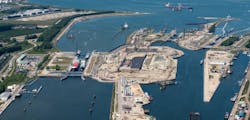Sometimes it’s hard to stay hearty in the face of multiple disappointments.
Already this year several companies advancing the commercial and industrial energy transition have gone bankrupt or are winding down operations. With a new administration threatening to sweep out the former one’s clean energy moves and also a pushback against decarbonization because of accelerating demand from the rise of AI and reindustrialization, it’s proving to be tough sledding for startups in the winter of 2024-2025.
Don't lose heart. We've been here before. And even the most successful business movements counted their winners and losers in the march toward acceptance.
Names like Nikola Motors, Hyzon, Canoo and BlockEnergy may or may not be remembered through the mists of time and business cycles, but they are hardly alone. Think about it: The expansion of the automobile market is possibly the greatest industrial achievement of the 20th century, but don’t think it was just happy and rich Chevrolet, Ford and Toyota from the beginning.
Dozens of would-be automotive startups were born, struggled and died in the wild early days of automotive production. Names like Apex, Bell and Cameron were among countless companies which came and went, proving that staying alive even in a growing industry was not as easy as A, B, C.
On the modern space industry front, Elon Musk’s SpaceX was nearly down to its last few million dollars and close to liquidation when a new government contract saved it.
New sectors are deep in risk and reward mechanisms. Some get it right and some don’t. Some do it right and still don’t make it, but providence blesses others in unexpected ways. Luck happens.
This week hydrogen vehicle manufacturer Nikola Corp. announced it was declaring for Chapter 11 bankruptcy protection. The company only has about $47 million in cash on hand to survive while it sells some assets and attempts to reorganize.
"Like other companies in the electric vehicle industry, we have faced various market and macroeconomic factors that have impacted our ability to operate," Nikola Corp. CEO Steve Girsky said in a statement.
Nikola’s filing follows EV van maker Canoo which, despite contracts with the U.S. Postal Service and Walmart, could not survive a lack of cashflow and new capital, so was forced to liquidate through a Chapter 7 bankruptcy.
BlockEnergy, which was developing battery storage microgrids to power neighborhoods in Florida, New Mexico and Maryland, reportedly is winding down its operations out of uncertainty over project development during the Trump Administration, according to a news report.
The Lakeland, Florida, residential microgrid was announced in 2023 by parent company Block Energy LLC utilizing its BlockEnergy battery microgrid technology. Earlier this month, Lakeland’s Assistant City Attorney Ramona Sirianni reportedly told city commissioners that the project was terminating because of the BlockEnergy winddown.
Block Energy had announced plans for another residential microgrid development in Fairmount Heights, Maryland, but the fate of that project is unknown. Block Energy has not mentioned a bankruptcy or winding down on its website.
Hydrogen fuel cell-electric trucking manufacturer Hyzon closed its doors earlier this month. The company was delisted from the Nasdaq exchange.
Even so, the news from Nikola, Hyzon, Canoo and Block Energy is disappointing for those envisioning a brave and profitable new world of decentralized and decarbonization energy. It’s easy for some to believe that the promise of the energy transition is over, the movement wrecked by political roadblocks and harsh economic realities.
It’s certainly and immediately bad news for those who worked for the companies, but this kind of ebb and flow is normal for any nascent industry. Think of all the defunct automobile companies and all of the Dot.Com entities which went bust in the early 2000s. Yet we still have millions of cars, software programs and computers sold every year. Those industries are flourishing. For the most part, those discarded employees found new jobs, maybe even better.
This energy transition is not playing out as predicted a decade ago, but it will play on. The rise of AI and data center capacity demand will result in more conventional power solutions than previously envisioned when flat load growth was the forecast.
And this exponential growth in demand for electrification will require a truly “all of the above” approach. Yes, natural gas power plants will expand and new ones built, but also solar and battery storage and possibly small modular reactor nuclear and hydrogen.
Only recently arrived reports from Mercom Capital, the Solar Energy Industries Association and others that solar investment was hitting $25 billion and more per year. The battery storage market more than tripled in 2023 and reached close to 100 GWh of new capacity in 2024, according to Bloomberg New Energy Finance.
The investors are willing, but a clear vision of the future is weak. Yet we’ve been here before, and despite that great companies emerged and survived those valleys.
The future demands bold movement on energy, and renewables and other lower carbon resources will prove their worth in the long run. It’s a long game, and you can take heart in that.





